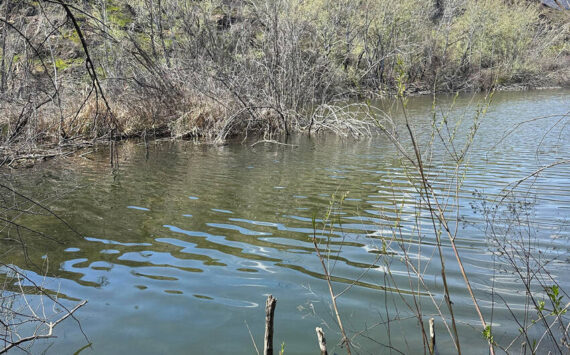TWISP – For the second time in a year, conservation groups have been forced to file a lawsuit challenging a decision by the Okanogan County Commissioners to open hundreds of miles to use by All-Terrain Vehicles (ATVs) as being in violation of state law.
Conservation Northwest (CNW) and the Methow Valley Citizens’ Council (MVCC) support responsible riding, but say that the county adopted the latest ATV Ordinance like signing a blank check, without doing even a basic analysis of the residents, infrastructure or resources that might be affected or harmed by allowing ATVs virtually everywhere.
The groups filed the first lawsuit in August 2013, challenging two sweeping ordinances that allowed ATVs on most roads in the county, including high-speed highways. The lawsuit charged that the county had adopted the ordinances with no study of environmental impacts from opening these roads to ATVs and contrary to the restrictions in the 2013 state law allowing counties to open only lower speed roads to use by ATVs. In response to the suit, in March 2014 the County Commissioners repealed both ordinances.
In May, the Commissioners returned with a proposal to open almost 600 miles of county roads to ATVs, after what the conservation groups say was “going through the motions of complying with another state law (SEPA) that requires thoughtful environmental analysis of the likely impacts of an action like opening these roads to ATVs.” MVCC and CNW objected to the proposal in written comments and filed an administrative appeal of the Planning Department’s determination that the proposal would have no significant environmental impact.
The MVCC and CNW believe strongly that opening hundreds of miles of county roads to ATVs will result in increased illegal off-road riding, which has been proven to damage fragile soils, vegetation, streams and wildlife habitat. In addition, the groups pointed out what they call “deficiencies regarding the lack of environmental assessment of impacts to public safety agencies and other vehicles on the affected roads.”
On June 16, the Board of County Commissioners denied the appeal with virtually no discussion and without reading the evidence presented, according to the groups. A week later, they passed an ordinance opening 400 miles of county roads to ATVs. In response to an appeal filed by the Colville Confederated Tribes, the Ordinance was changed to reflect that most roads on the Colville Reservation remain off-limits to ATVs.
“We are extremely disappointed that, once again, the commissioners chose to disregard the law and public comment and that another legal challenge is necessary,” said Maggie Coon, who chairs the board of the Methow Valley Citizens’ Council.
“We believe the county’s actions will increase confusion and encourage illegal ATV riding on sensitive lands, degrading important habitat for fish and wildlife.”
Conservation Northwest and the Methow Valley Citizens’ Council say they support the responsible use of ATVs in appropriate places, in a way that keeps people safe, respects private property, protects wildlife habitat, and minimizes conflict with other vehicles and recreationists. The groups believe that the Okanogan County Commissioners’ recent actions run counter to that goal.
In a previous request for a statement regarding the group’s original lawsuit, Okanogan County Commissioner Jim Detro (Position 3) said he was unable to comment because the issue involved litigation.
TWISP – For the second time in a year, conservation groups have been forced to file a lawsuit challenging a decision by the Okanogan County Commissioners to open hundreds of miles to use by All-Terrain Vehicles (ATVs) as being in violation of state law. Conservation Northwest (CNW) and the Methow Valley CitizensÕ Council (MVCC) support responsible riding, but say that the county adopted the latest ATV Ordinance like signing a blank check, without doing even a basic analysis of the residents, infrastructure or resources that might be affected or harmed by allowing ATVÕs virtually everywhere. The groups filed the first lawsuit in August 2013, challenging two sweeping ordinances that allowed ATVs on most roads in the county, including high speed highways. The lawsuit charged that the county had adopted the ordinances with no study of environmental impacts from opening these roads to ATVs and contrary to the restrictions in the 2013 state law allowing counties to open only lower speed roads to use by ATVs. In response to the suit, in March 2014 the County Commissioners repealed both ordinances. In May, the Commissioners returned with a proposal to open almost 600 miles of county roads to ATVs, after what the conservation groups say was “going through the motions of complying with another state law (SEPA) that requires thoughtful environmental analysis of the likely impacts of an action like opening these roads to ATVs.” MVCC and CNW objected to the proposal in written comments and filed an administrative appeal of the Planning DepartmentÕs determination that the proposal would have no significant environmental impact. The MVCC and CNW believe strongly that opening hundreds of miles of county roads to ATVs will result in increased illegal off-road riding, which has been proven to damage fragile soils, vegetation, streams, and wildlife habitat. In addition, the groups pointed out what they call “deficiencies regarding the lack of environmental assessment of impacts to public safety agencies and other vehicles on the affected roads.” On June 16, the Board of County Commissioners denied the appeal with virtually no discussion and without reading the evidence presented, according to the groups. A week later, they passed an ordinance opening 400 miles of county roads to ATVs. In response to an appeal filed by the Colville Confederated Tribes, the Ordinance was changed to reflect that most roads on the Colville Reservation remain off-limits to ATVs. ÒWe are extremely disappointed that, once again, the commissioners chose to disregard the law and public comment and that another legal challenge is necessary,” said Maggie Coon, who chairs the board of the Methow Valley CitizensÕ Council. ÒWe believe the countyÕs actions will increase confusion and encourage illegal ATV riding on sensitive lands, degrading important habitat for fish and wildlife.Ó Conservation Northwest and the Methow Valley CitizensÕ Council say they support the responsible use of ATVs in appropriate places, in a way that keeps people safe, respects private property, protects wildlife habitat, and minimizes conflict with other vehicles and recreationists. The groups believe that the Okanogan County CommissionersÕ recent actions run counter to that goal. In a previous request for a statement regarding the groups original lawsuit, Okanogan County Commissioner Jim Detro (Position 3) said he was unable to comment because the issue involved litigation.
TWISP – For the second time in a year, conservation groups have been forced to file a lawsuit challenging a decision by the Okanogan County Commissioners to open hundreds of miles to use by All-Terrain Vehicles (ATVs) as being in violation of state law.
Conservation Northwest (CNW) and the Methow Valley Citizens’ Council (MVCC) support responsible riding, but say that the county adopted the latest ATV Ordinance like signing a blank check, without doing even a basic analysis of the residents, infrastructure or resources that might be affected or harmed by allowing ATVs virtually everywhere.
The groups filed the first lawsuit in August 2013, challenging two sweeping ordinances that allowed ATVs on most roads in the county, including high speed highways. The lawsuit charged that the county had adopted the ordinances with no study of environmental impacts from opening these roads to ATVs and contrary to the restrictions in the 2013 state law allowing counties to open only lower speed roads to use by ATVs. In response to the suit, in March 2014 the County Commissioners repealed both ordinances.
In May, the Commissioners returned with a proposal to open almost 600 miles of county roads to ATVs, after what the conservation groups say was “going through the motions of complying with another state law (SEPA) that requires thoughtful environmental analysis of the likely impacts of an action like opening these roads to ATVs.” MVCC and CNW objected to the proposal in written comments and filed an administrative appeal of the Planning Department’s determination that the proposal would have no significant environmental impact.
The MVCC and CNW believe strongly that opening hundreds of miles of county roads to ATVs will result in increased illegal off-road riding, which has been proven to damage fragile soils, vegetation, streams, and wildlife habitat. In addition, the groups pointed out what they call “deficiencies regarding the lack of environmental assessment of impacts to public safety agencies and other vehicles on the affected roads.”
On June 16, the Board of County Commissioners denied the appeal with virtually no discussion and without reading the evidence presented, according to the groups. A week later, they passed an ordinance opening 400 miles of county roads to ATVs. In response to an appeal filed by the Colville Confederated Tribes, the Ordinance was changed to reflect that most roads on the Colville Reservation remain off-limits to ATVs.
ÒWe are extremely disappointed that, once again, the commissioners chose to disregard the law and public comment and that another legal challenge is necessary,” said Maggie Coon, who chairs the board of the Methow Valley Citizens’ Council.
“We believe the county’s actions will increase confusion and encourage illegal ATV riding on sensitive lands, degrading important habitat for fish and wildlife.”
Conservation Northwest and the Methow Valley Citizens’ Council say they support the responsible use of ATVs in appropriate places, in a way that keeps people safe, respects private property, protects wildlife habitat, and minimizes conflict with other vehicles and recreationists. The groups believe that the Okanogan County Commissioners’ recent actions run counter to that goal.
In a previous request for a statement regarding the groups original lawsuit, Okanogan County Commissioner Jim Detro (Position 3) said he was unable to comment because the issue involved litigation.






